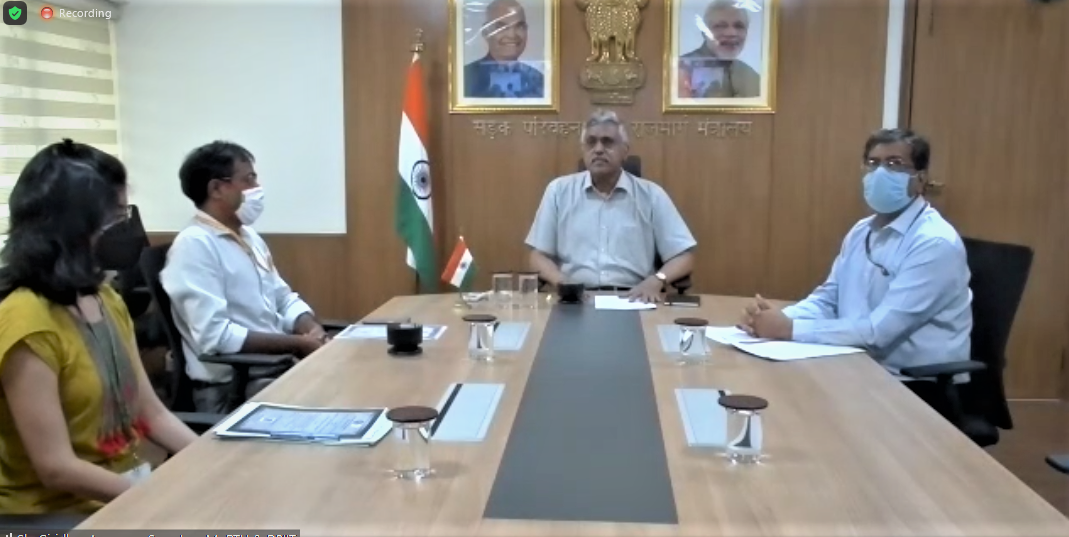Indian Institute of Technology Madras will collaborate with the Ministry of Road Transport and Highways (MoRTH), Government of India, on Pavement Engineering and Intelligent Transportation Systems.
This includes research on novel pavement materials and technologies, hydrogen cell transportation, automatic vehicle classification, novel toll systems, incident management systems, traveller information systems, FastTAG data analytics and traffic simulations besides transportation safety, a release said.
Towards this, a ‘MoRTH Chair’ is being created at IIT Madras, to focus on R&D, teaching and training in Traffic and Highway Engineering. The Chair Professor will act as a Strategic Advisor to MoRTH in Road Transport and Highways.
The Chair professor will interface with the Standard and Research (S&R) wing of MoRTH, facilitating need-based research in the area of ‘Traffic and Highway Engineering.’
The MoU for setting up this Chair was signed during a virtual event on August 17, by Prof. Mahesh Panchagnula, Dean (Alumni and Corporate Relations) and Prof. Bhaskar Ramamurthi, Director, IIT Madras, as well as Indresh Pandey, Director General (Road Development) and Giridhar Aramane, Secretary, MoRTH, in the presence of Prof. Manu Santhanam, Head, Department of Civil Engineering, IIT Madras.
Giridhar Aramane, IAS, Secretary, Road Transport and Highways, Government of India, said, “IIT Madras should concentrate on developing less polluting pavement engineering technologies as well as intelligent transportation systems.”
“We are already engaged with IIT Madras in a major way in terms of consultancies. This Chair Professorship as well as this entire program can be directed towards important and innovative R&D work,” he added.
The Chair Professor will also undertake R&D activities in Pavement Engineering including emerging materials and technologies such as
- Use of coir and other bio-derived materials
- Use of alternative aggregates such as recycled concrete and asphalt pavement
- Use of environmentally sustainable materials for highway pavements
This collaboration will also facilitate PhD research programs on areas selected by MoRTH. IIT Madras will train 8 to 10 students including MoRTH’s nominated officers in the field of Highway Engineering.
Thanking MoRTH for reposing faith in the Institute, Prof. Bhaskar Ramamurthi, Director, IIT Madras, said, “We are happy and proud to receive this endowment and the endorsement from Ministry of Road Transport and Highways to set up this Chair Professorship.”
“It will provide an impetus for application-oriented research. We are already active in Pavement Engineering and Intelligent Transportation Systems. A lot of our know-how already reaches the field through industry collaboration. Our efforts have also reduced accidents in highways across the country. There is a lot of good research going on and a lot of capability had been built. We are well-placed to take up interesting projects and seed them with the proceeds of this endowment,” he added.
IIT Madras will allow MoRTH Officers (subject to required qualification) to act as co-supervisors for M.Tech./MS and PhD projects of students on the recommendation of supervisors at IIT Madras as per the institute norms.
The Chair Professor will also advise the Highway Research Board of Indian Road Congress for identification and monitoring of R&D activities and act as an ambassador of highway development in the country.
Highlighting the benefits of this collaboration, Prof. Manu Santhanam, Head, Department of Civil Engineering, IIT Madras, said, “IIT Madras has arguably the best transportation engineering research group in the country today, with the areas of work covering pavement materials and intelligent transportation systems.”
The Chair Professor will act as a facilitator for promoting collaboration between MoRTH, IIT Madras and other academic and research institutions/industries from India and abroad. The Professor will also assist in the evaluation and introduction of new technology, ITS and recycling, equipment and material for improving road safety and operational efficiencies.





